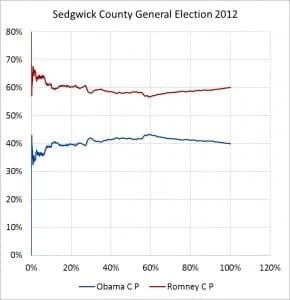A Wichita statistician is thwarted in efforts to obtain data that might explain a strange observation.
A paper details the discovery of unexplained patterns in election returns. The paper is titled 2008/2012 Election Anomalies, Results, Analysis and Concerns. The authors are Francois Choquette and James Johnson. A passage from the introduction explains what has been noticed:
Back in February 2012 during the South Carolina primaries, a keen observer noted that Republican candidate Mitt Romney had an unusual gain of votes in larger precincts. Analysts noted this effect violated expected statistics. Specifically, the percentage of votes in each precinct strangely increased as a function of precinct size (vote tally). The vote gain is correlated to precinct size, not the precinct location, be it in cities or rural areas. This anomaly is not apparent in other elections that don’t include Republican candidates. In 2008, Mitt Romney had the benefit of this anomaly and then the gain switched to John McCain once Romney exited the campaign. The Democrat Party elections we looked at don’t show this problem. (emphasis added)
There is a mysterious correlation between votes for Republican candidates and the number of votes cast in a precinct. So far no one has advanced a convincing reason why this should happen.

But Kansas Secretary of State Kris Kobach has said no, the time for viewing the tapes has passed. According to Kansas law, he says, the records are sealed. (“Kobach on Sedgwick County election lawsuit: Time is past, votes are sealed, April 5, 2015 Wichita Eagle)
The Choquette and Johnson paper gives the method for examining the relationship between precinct size and candidate vote percentages. I applied the method to three recent Sedgwick County elections. The anomaly appears to be present.

I was concerned that the paper tapes produced by voting machines might contain information that would link individual voters with the votes they cast. That would be a potential problem concerning the confidentiality of votes. But when I voted this week, I watched the information printed on the tape, and I don’t believe there is a concern.

Leave a Reply